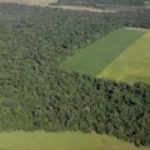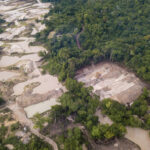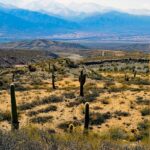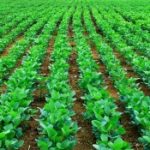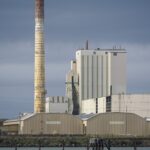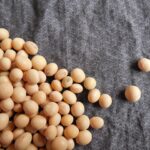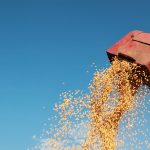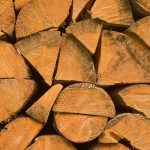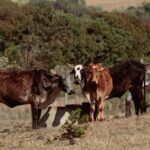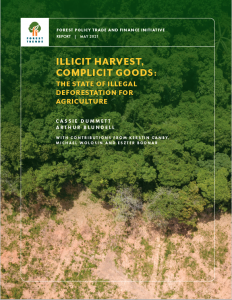
The expansion of commodity agriculture into tropical and subtropical woodlands degrades ecosystem functionality, biodiversity, and the livelihood base of millions of people. Understanding where and how agricultural frontiers emerge is thus important. Yet, existing monitoring approaches typically focus on mapping deforestation and do not capture the shifts in land access and ownership that lay the ground for agricultural expansion, thereby missing early stages of frontier development. We develop an approach that captures these early dynamics and apply it to the entire 1,1 million km2 of the Chaco, a global deforestation hotspot. Through the detection of linear features indicative of land claims and the analysis of their spatial–temporal dynamics, we reveal that the footprint of agricultural frontiers in the region extends far beyond that of deforestation. Most of the Chaco shows signs of land claiming, and although claiming activity is especially concentrated close to active deforestation, emergent claiming in remote parts of the Bolivian and Paraguayan Chaco indicates rapidly growing interest in land in these regions. Finally, the strong spatial correlation between land claiming and the disappearance of smallholder homesteads points to the social repercussions of early agricultural frontier expansion in the Chaco. By offering a transferable template to map land-control indicators at scale, our approach enables a better understanding of frontier processes and more accurate targeting of policy interventions in emerging agricultural frontiers globally.
Extractive economies in Latin America, such as mining, fishing, and logging — where legal and illegal activity often intersect — along with crimes like wildlife trafficking and drug production, pose some of the gravest threats to the survival of the region’s ecosystems and the people who defend them. This article examines the main criminal economies driving the degradation of forests, rivers, and oceans across Latin America and the Caribbean: illegal gold mining, drug trafficking and its infrastructure, timber trafficking, land grabbing, illegal/unreported/unregulated fishing, and wildlife tracking
Interpol said 12 companies were involved in the alleged deforestation and trafficking of native tree species, and that it identified two criminal networks. A spokesman said alleged crimes include illegal logging of various tree species, illicit trafficking of timber, use of fake documents to traffic in illegal wood, and various acts of deforestation. He said the delay in announcing the arrests was in part to allow for follow-up investigation.
Gabriel Funari, head of the Amazon Observatory of Illicit Economies for Global Initiative, said they are seeing large transnational criminal groups that have grown through drug trafficking revenue, such as one of Brazil’s largest crime gangs, Primeiro Comando da Capital — commonly known as PCC — increasingly diversifying their investment portfolios into various illicit markets with goods that pass through the Tri-Border, like firearms, timber, wildlife and gold.
This is a presentation made to the 30th MEETING OF THE “EXPERT GROUP/MULTI-STAKEHOLDER PLATFORM ON PROTECTING AND RESTORING THE WORLD’S FORESTS at the European Commission. VISEC works on value chains for soybean and beef to fulfill EUDR
requirements covering the country and including all
operators of the value chain with independent auditing parties.
Increased trade in agricultural products between Mercosur countries and the EU could potentially aggravate deforestation, raising questions about the compatibility of the agreement with environmental goals.
Russia’s supply chain is bleeding, with Western sanctions to blame for one of Russia’s largest forestry and paper companies urgently raising funds through the Moscow Stock Exchange— causing its share price to plunge more than 20% in a single day’s trade.
Russia is suffering from high logistics costs, slowing Chinese demand, and increased competition from India, Brazil, and Argentina, forcing mills to cut production volumes.
Lawmakers in Argentina passed a massive reform package to overhaul the economy, but many of its policies weaken protections for local communities and encourage accelerated investment in projects with a record of deforestation and pollution. With over 230 articles, the controversial bill was approved by the senate earlier this month then sent back to the lower house for a final vote.
One article in the reform streamlines the development of large investment in infrastructure, oil and gas and the mining of copper and lithium, among other things. It could let companies off the hook for endangering the environment, critics say.
Another article modifies an administrative law on public hearings that could make it harder for local communities to contest new projects.
This is the second part of a cross-border investigation conducted by Voxeurop and Periodistas por el Planeta into how soy from deforestation-prone areas in Argentina arrives in Europe by exploiting legal loopholes and abusing self-regulation. You can read the first part of this investigation here.
Europe’s food giants turn a blind eye to deforestation in Argentina – VoxEurop
Purchases will start in 2024 and account for about 6% of all Argentina’s soy area in the first year of the deal, Bayer executives Juan Farinati and Fábio Passos said in an interview. The German seed giant will work with 300 Argentine farmers to certify the
The world’s largest agricultural commodities trader won’t buy any major crops from deforested areas in Brazil, Argentina and Uruguay from 2025, it said Monday in a statement. The pledge includes for the first time supplies from third parties — the hardest ones to trace.
Cargill is building on last year’s pledge to source deforestation-free soy supplies from the Amazon, Cerrado and Gran Chaco biomes by adding corn, wheat and cotton to its goal and expanding its geographic scope.
Argentina’s native woodlands are under threat from the expansion of soy and cattle ranching, with farmers often willing to accept low fines for clearing land to take advantage of high global grains prices.
Barclays has published new supply chain sustainability requirements for clients in forest-risk commodity sectors including beef and palm oil.
Barclay’s has added a new Forestry and Agricultural Commodities statement to its website this week. The statement stipulates that Barclays has “no appetite” to support companies directly involved in illegal forest clearance.
From the beginning of July, beef producers will not be able to undertake work in areas of the Amazon rainforest cleared or converted after 2008.
Those producing beef in South America will also need to prove that they gave deforestation-free supply chains by 2025. By the end of 2025, these firms will need to update their policy commitments on deforestation and human rights, and to monitor and report on deforestation-free product volumes.
Ashland is the unexpected home of the country’s only full-service forensic laboratory devoted to tracking illegally transported animals and plants. Now the lab is employing a new strategy to get forensic tools to U.S. ports to stop the illegal timber trade.
Some 60 percent of the world’s lithium reserves can be found in the so-called lithium triangle, a region that encompasses Chile, Argentina, and Bolivia. It’s not just lithium either: Peru and Chile are the world’s two largest copper producers, while Brazil is home to 17 percent of all nickel reserves.
That has sparked a global scramble to tap the region’s wealth—one in which Chinese companies have an edge. Beyond lithium, Beijing has also struck deals for solar, wind, and hydroelectric projects across the region, pouring hundreds of millions of dollars into solar parks in Argentina and Brazil as well as signing contracts for hydroelectric projects in Bolivia and Argentina.
Part of the allure of partnering with Beijing, experts say, is the very nature of Chinese deals. China has boasted about its no-strings-attached financing, with fewer economic and political conditions than Western lenders. “[Governments] know that they’re not going to get the same level of quality by partnering with Chinese companies, but they also will get fewer headaches, fewer regulations, fewer lessons on the environment, fewer complaints from [nongovernmental organizations],” Berg said.
The tech-driven sustainability transition poses new challenges for resource governance.
We identify a discursive reframing of extraction in Argentina: arguments of climate protection are used to justify social-ecological depletion and destruction.
Our findings confirm what Voskoboynik and Andreucci have recently argued: Resource extraction is increasingly proposed as not only compatible, but rather framed as a necessity to deal with climate change.
This green extractivism is grounded in a non-ideological reframing of commodity extraction: the climate change consensus.
The climate change consensus is increasingly replacing the commodity consensus of the 2000s.
In recent months, experts have warned about the close relationship between drug trafficking and the illegal timber trade in South America — a reality that is becoming increasingly visible in Argentina. Among the three large drug seizures the Argentine National Gendarmerie made in February 2022, two consisted of marijuana hidden in timber shipments.
Fianna Fáil MEP, Billy Kelleher has commented on the agreement between the European Commission and European Council to block products, such a beef or cattle, from entering the EU market which are linked to deforestation, and potential impacts on South American exporters of cattle products.
Click here to access the Global Illegal Logging and Associated Trade (ILAT) Risk assessment tool and to download the Forest Trends User Guide describing the functionality of the ILAT Risk Data Tool.
Click here to access the Cattle Data Tool.

